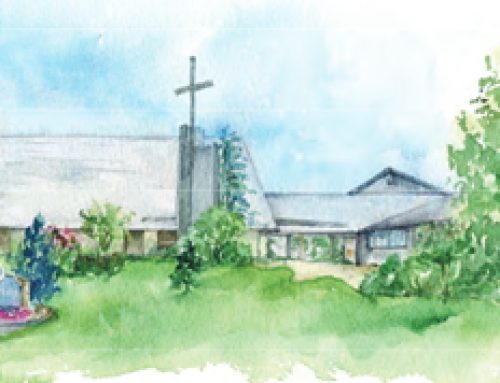FROM THE PASTOR’S DESK
My Dear Parishioners:
Usually when we think of the word “love,” we think of romance, of hearts and flowers. But love is more than warm affection and sensual intimacy. There is a larger meaning to love which is revealed in today’s gospel. For in the gospel Jesus gives a new commandment: we are to love one another as he has loved us. So how has Jesus loved us? With warm affection? Of course. But more than that, Jesus has loved us with action. Jesus has laid down his life for our salvation. In this action of sacrifice, in this action of love, God has raised him up and made him the head of a new creation. In Jesus’ active love, the reign of God has begun in our midst. Evil is being destroyed. God’s will is being established among us. So in Jesus, love is more than kind regards. Love is action. Love is more than amorous feelings. Love is power, the power to change the earth.
Love is power. In fact, there is no other power on earth for good stronger than love. It is love that calls tired parents out of their bed to care for a sick child. It is love that motivates a hospice worker to be present to a dying woman. It is love that leads a young man or woman to give two years of their life in the Peace Corps, serving in an inner city or a third world country. It is love that animates thousands of soup kitchens and homeless shelters and AIDS hospices. Love is a father or mother working two jobs to feed their children and pay the rent. Love is the choice to forgive an enemy or to sacrifice for peace. Love is what makes the real heroes of our world: a young man or woman who could work in a prestigious law firm but chooses instead to work among the poor; a firefighter willing to rush into the World Trade Tower and rescue screaming victims. There is no force for good greater in our world than the power of love.
But we do not have enough of it. For all the love that there is, there is still not enough to bring about God’s kingdom. For some reason, we think that we should hold on to love, to preserve it. But love only has power when we let it go and let it flow out. It is then that it can make its effect upon others in our midst. For some reason, we think we should limit love to only certain groups, to our family and friends, to those who think and act like us, to those who we know and with whom we are familiar. But if we are to love as Jesus has loved us, we must push beyond the limits which we place on love. For who did Jesus love? For whom did Jesus give his life? Jesus did not give his life only for his mother and his disciples, only for the Jews and the poor, only for those who were gay or educated, only for those who were black or those who were good. Jesus gave his life for everyone, for all of humanity. If we are to love as he loved us, then we must love in a way which is wider and deeper than the way to which we are inclined. We must push beyond whatever limits we place on love and join ourselves with others who love, so that God’s kingdom might be built up, so that we might participate in recreating the earth.
This truth is expressed most beautifully by the Jesuit theologian Tielhard deChardin. Over fifty years ago he wrote, “Someday, after we have mastered the winds and the waves, the tides and gravity, we shall harness for God the energies of love. And then for the second time in the history of the world, humans will have discovered fire.” We need that fire, the fire of love. We need that power, the power to unite rather than divide, to build up rather than destroy, to heal rather than attack, the power to work for justice rather than to feed off greed. We need the power of love. We can release it, if we love as Jesus has loved us.
Peace,
Fr. Monteleone
To read complete bulletin click here



